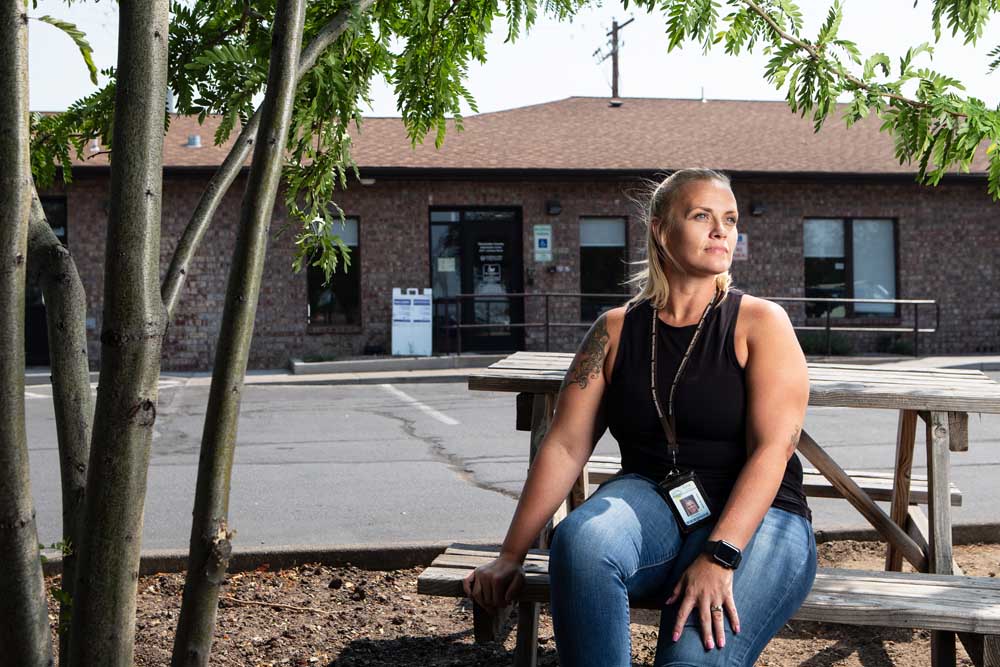Her crimes behind her, Central Oregon woman finds a way to recover the life she lost
Published 5:45 am Wednesday, August 9, 2023

- Erica Wimbish triumphed over addiction and a criminal conviction recently. She had a burglary conviction removed in Deschutes County under Senate Bill 819, an Oregon criminal justice reform law.
Erica Wimbish reckoned she was near death. At least, that’s what Sgt. Kent van der Kamp told her in 2016 after she rolled up her sleeves to show him the track marks on her arms.
“I don’t want to do this anymore,” she said.
Trending
Van der Kamp, then a Deschutes County Sheriff’s Office detective, and Wimbish, homeless and isolated, were well acquainted.
He had arrested her several times for drug possession over the course of a decade. They had spent hours talking before he would book her into jail, conversations that often included compassionate but firm warnings from van der Kamp.
“And then the addiction would grab her and pull her back,” said van der Kamp, now 50.
Recovering addict now uses story for peer support
Trending
Wimbish, now 35, stopped using meth on Dec. 23, 2016, the same day she showed van der Kamp her scarred arms. She stayed clean and got a job working for Deschutes County. She regained custody of her two children, who were taken from her at the depths of her addiction. And she became a homeowner.
But Wimbish’s story is not one of redemption. It’s about what happens after that arrives and a question she, and many other Oregonians, have asked: Can I get my life back?
It took Wimbish years to recover what she lost. But her criminal history, especially a 2016 burglary conviction, clung to her like a stain.
That is, until recently. On June 28, her burglary conviction was erased under Senate Bill 819.
The bill, which was passed in the Legislature in 2021 and became effective in January 2022, allows Oregonians with criminal convictions, with the support of a district attorney, to ask a judge to reconsider their cases.
That could result in a felony conviction becoming a misdemeanor, a conviction erased altogether, the length of a person’s sentence reduced or the request rejected.
“That bill was designed exactly for people like Erica,” said van der Kamp, now a member of the Central Oregon Drug Enforcement team, a multijurisdictional narcotics task force.
Convictions stand in the way of homeownership, gun ownership and certain types of employment or certifications. A conviction also prevents people from involvement at their child’s school, like chaperoning a field trip or coaching a kids soccer team, said Aliza Kaplan, the director of Lewis & Clark Law School’s Criminal Justice Reform Clinic and an architect of the bill.
“The more clients we had, the more I realized how important it is to have a clear record,” Kaplan said. “They can be in the world and just feel more confident.”
For Wimbish, a fully erased burglary conviction was a rush of emotions.
“Committing those crimes is not the person I was,” she said. “It was a product of my circumstances and the choices that I made.”
Senate Bill 819
Each Oregon county handles Senate Bill 819 a little differently. Some, like Jefferson County, haven’t used it at all. But in Deschutes County, since 2022, 76 people have asked the district attorney to review their cases.
Only four people have had their cases successfully changed. Erica was one of those four.
“Most of those are rejected because the people who are applying really haven’t been putting in the kinds of efforts Ms. Wimbish has,” Deschutes County’s District Attorney Steve Gunnels said.
Oregon removed her Deschutes County felony conviction. Now she’s starting anew.
Crook County District Attorney Kari Hathorn hasn’t seen any cases that fit the criteria for reconsideration since she took office in February 2022. For her, one of the most important things to consider is the victims of the crimes. Some convictions are excluded from reconsideration, especially violent crimes.
Hathorn looks for whether an applicant has taken accountability and what is in the interest of justice, the community and the victim, she said.
“A victim would need to be consulted on any potential application to the court. They have a constitutional right to be consulted on cases,” Hathorn said.
Then there’s something about the defendants, something about what they’ve done in the aftermath of the crime, that warrants a second review of whether justice was served, she said.
Criminal justice reform
In Lane County, there have been more than 100 requests for convictions to be reconsidered by its district attorney’s office. Thirty-two of them were recommended to a judge for approval, and all 32 convictions were modified in some way or another, said Christopher Parosa, chief deputy district attorney for Lane County.
“We always view these through the prism of public safety,” Parosa said.
If the risk to public safety is too great by granting someone a conviction or sentence reconsideration, officials don’t do it.
Kaplan lauded Lane County and Parosa for the efficient approach to Senate Bill 819 cases, especially while other places like Multnomah County are currently experiencing delays because of a backlog of cases, she said.
Legislature passes bill allowing prosecutors, prisoners to ask for conviction reviews
The law opens an entirely new door to criminal justice reform. Lane County had been inconsistently sentencing people for property crimes for years prior to the bill’s passage, Parosa said.
Property crimes include things like Wimbish’s criminal history of burglary and theft along with trespassing, vandalism and others.
“We knew, and had been told that our sentences were commonly out of whack with what the rest of the state is doing,” he said.
The law ultimately granted Lane County’s court the authority to reevaluate these cases. It was an opportunity to right previous wrongs.
Parosa finds the law to be so important he often takes the cases home with him at the end of the workday. He enjoys poring over them.
“These people we’re granting relief to — if you dug into their histories, you’d see they’ve made real effort to change their lives,” Parosa said. “Where that happens, we should be celebrating it as a society.”
Wimbish is where that happens. She is working to expunge her drug possession charges in other counties for a completely clean record.
She and van der Kamp are now friends.
“She’s a force,” he said.
“He’s like a big brother,” she said.
Wimbish sees people through her work with the county that she used to encounter living on the streets, both law enforcement and people stuck in the cycle of addiction.
She often shares with them her story of suffering, joy and relentless self-improvement.
“For me to share that with other people is a glimmer of hope in this messed up world,” Wimbish said, “Even if just for a moment.”








